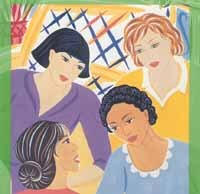Textos em Inglês: The Merchant With Four Wives
Você gosta de textos em inglês, certo? Então, leia, curta e compartilhe o texto abaixo. Ele é uma adaptação de uma história comum no mundo árabe. Trata-se de uma parábola sufi que conta a história de um comerciante (merchant) e suas quatro esposas (four wives). A versão que segue abaixo é uma simplificada por Turgay Evren e narrada por Lee Wright. Como é de praxe nas histórias desse gênero, há no final uma pequena lição de moral (bottom line) interpretada para nossa realidade.
Para deixar tudo ainda melhor, as palavras/expressões sublinhadas e com um número lado são traduzidas no final do texto. As outras marcadas com um link apontam para dicas relacionadas a cada uma dentro do Inglês na Ponta da Língua. Assim, os textos em inglês publicados ficarão muito mais interessantes de ler, ouvir, aprender e revisar conteúdo.
THE MERCHANT WITH FOUR WIVES
There was a rich merchant who had four wives. He loved the fourth wife the most, and adorned her with rich robes and treated her to delicacies. He took great care of her and gave her nothing but the best (1).

He also loved the third wife very much. He’s very proud of her and always wanted to show off her to his friends. However, the merchant is always in great fear that she might run away with some other men.
He too loved his second wife. She is a very considerate person (2), always patient and in fact is the merchant’s confidant (3). Whenever the merchant faced some problems, he always turned to his second wife and she would always help him out and guide him through difficult times.
Now, the merchant’s first wife is a very loyal partner and has made great contributions in maintaining his wealth and business as well as (4) taking care of the household (5). However, the merchant did not love the first wife and although she loved him deeply, he hardly took notice of her.
One day, the merchant fell ill. Before long, he knew that he was going to die soon. He thought of his luxurious life and told himself, “Now I have four wives with me. But when I die, I’ll be alone. How lonely I’ll be!“
Thus, he asked the fourth wife, “I loved you most, endowed you with the finest clothing and showered great care over you. Now that I’m dying, will you follow me and keep me company?” “No way!” replied the fourth wife and she walked away without another word. The answer cut like sharp knife right into the merchant’s heart.
The sad merchant then asked the third wife, “I have loved you so much for all my life. Now that I’m dying, will you follow me and keep me company?” “No!” replied the third wife. “Life is so good over here! I’m going to remarry when you die!” The merchant’s heart sank and turned cold.
He then asked the second wife, “I always turned to you for help and you’ve always helped me out. Now I need your help again. When I die, will you follow me and keep me company?” “I’m sorry, I can’t help you out this time!” replied the second wife. “At the very most, I can only send you to your grave.” The answer came like a bolt of thunder and the merchant was devastated.
Then a voice called out : “I’ll leave with you. I’ll follow you no matter where you go (6).” The merchant looked up and there was his first wife. She was so skinny, almost like she suffered from malnutrition. Greatly grieved, the merchant said, “I should have taken much better care of you while I could have!“
Actually, we all have four wives in our lives.
The fourth wife is our body. No matter how much time and effort we lavish (7) in making it look good, it’ll never leave with us when we die.
Our third wife? Our possessions, status and wealth. When we die, they all go to others.
The second wife is our family and friends. No matter how close they had been there for us when we’re alive, the furthest they can stay by us is up to the grave.
Bottom line (8): the first wife is in fact our soul, often neglected in our pursuit (9) of material wealth and sensual pleasure.
Guess what? It is actually the only thing that follows us wherever we go. Perhaps, it’s a good idea to cultivate and strengthen it now; rather than to wait until we’re on our deathbed (10) to lament.
(01) dava a ela do bom e de melhor
(02) uma pessoa muito atenciosa
(03) confidente
(04) assim como
(05) família (incluindo todos os que moram em uma casa: membros diretos da família e seus empregados)
(06) onde quer que você vá
(07) gastar abundantemente
(08) moral da história
(09) busca
(10) leito de morte
Gostou dessa maneira diferente de aprender com textos em inglês? Então, deixe seu comentário abaixo. Quero saber se você gostou e o que dá para melhorar ainda. Caso queira ler mais textos em inglês, veja a dica Textos em Inglês Para Iniciantes. Lembre-se: quanto mais textos em inglês você ler, melhor será para o desenvolvimento dos seus conhecimentos da língua inglesa.
» Você acha que o Inglês na Ponta da Língua é, além de um site com dicas de inglês, um curso completo no qual você encontra de tudo? Material de áudio (podcasts), gramática, vocabulário, orientação ao consumidor, expressões, tira-dúvidas e muito mais? Então, que tal ajudar o Inglês na Ponta da Língua a continuar cada vez mais ativo.







Denilson,
Gostei muito.. é uma experiencia nova para mim.
como me considero em nível intermediário, teve muitas coisas que não entendi.
mas o que vai alavancar um upgrade, será o maior contato com a língua inglesa.
Parabéns!!
Link para download do audio: aqui
Muito Bom!
How can a do to download the audio file ? I'd like to listen it using my cell phone.
Regards,
Fabiano Canteri
That's funny! All you have to do is click on the button and that's it! 😉
Excellent!
Muito bom!!!
Excelente…
Ótimo para minha prática diária.
Denilson, bom dia!
Eu gostei muito do texto, é uma forma otima de aprender a pronuncia.
Eu faço curso de ingles a dois anos e ainda tenho dificuldades para falar pois nao tenho ninguem para praticar comigo, ja com esses textos eu sinto que irei melhorar muito.
Parabéns e obrigada!
Carlos,
Eu realmente gostei muito.
God bless you!
Muito legal Denilso! Apenas gostaria de fazer uma ressalva com relação ao próprio texto. Quando foi feita a comparação das esposas com a nossa vida, a quarta esposa foi comparada ao nosso corpo, "The fourth wife is our body. No matter how much time and effort we lavish (7) in making it look good, it’ll never leave us when we die". A frase diz "it'll NEVER leave us"…mas não seria o contrário? it WILL leave us? porque a quarta esposa foi a primeira que o deixou…e nossa carne também "nos deixa" quando morremos, certo? Então não importa o quanto nos esforcemos pra cuidar dele (corpo), ele nos deixará, porque entrará em decomposição…foi assim que entendi! Estou falando besteira?? rsrsrs
Bem observado, Denise. Eu copiei o texto de um site e não o comparei com o áudio. Na verdade, o correto é "It'll never leave with us when we die". A palavra "with" estava faltando, mas agora já foi corrigido. Thanks for that! 😉
Loved the story!!! Very useful to work with our students! Thanks for sharing it with us 😉
Muito bom!
Aaaaaaaaaaaaaaaaaaamei !!! Eu estou no 3º nível do básico e tenho buscado melhorar sempre. Esse tipo de material é muito bom, gostei muito: listening and reading, simultâmeamente. Não entendi muita coisa de primeira. Mas vou ficar ouvindo e praticando. Há palavras que eu não conhecia. Gostei mesmo deste post. Parabéns ! E obrigada =) Pois suas dicas tem sido de grande ajuda em meus estudos 😉
Obrigado, Denilso! Gostei muito do texto com audio.
Bem legal essa forma de aprendizado. Convivo muito com textos técnicos e me falta vocabulário na hora de ler assunto não técnicos. Essa forma me agrada muito. Brigadão!
Muito bom, continue assim……..
Highly good!!!
Congratulations, Denilso. Great job as always! Thank you very much!
Parabéns, Denilso! Belo trabalho, como sempre! Muito obrigada!
A-do-rei.
Ótimo Trabalho Denilso, está de parabéns!
Este tipo de leitura ensina muito mais do que as dicas, não que elas não sejam boas, são ótimas, mas colocar idéias em um contexto interessante nos faz elevar esforços para aprender as sentenças e, de quebra, ainda enriquecemos nossa cultura com uma história tão boa e edificante.
Mais uma vez, parabéns!
I really liked it! Excellent!
Excelente texto, porém seria interessante disponibilizar o texto em pdf e o áudio pra download como é feito com alguns materiais !!!
Eu gostei muito, cai nesse site sem querer, e gostei muito do encontrei, está de parabens!
🙂
Thanks Tati! Espero que continue acompanhando o Inglês na Ponta da Língua. Se quiser mais dicas, curta também nossa fanpage em <a href="http://www.facebook.com/inglesnapontadalingua” target=”_blank”>www.facebook.com/inglesnapontadalingua.
Take care!
Muito bom, excelente, da pra ouvir várias vezes.
I liki lot!!! I'M WITH ELSE EASER UNDERSTENDER SOME THINGS!!!
THANK YOU VERY MUCH
Larissa,
Thanks for your message! I think what you're trying to say is:
"I liked it a lot! I can easily understand a couple of things! Thank you very much!"
😉
Parabéns, este site é excelente! Ajuda muito!
Estou estudando inglês a pouco tempo. Gostei do texto, com certeza está ajudando nosso "listen to".
Very very good.
Congratulations.
Denilso,
O texto é excelente. Essa maneira facilita bastante o aprendizado. Vai ai uam dica: acho que poderia ser postado mais textos semanalmente.
Obrigada.
A intenção é colocar mais texto assim, Sueli. O problema é encontrar material bom e que possa ser usado sem infringir os direitos autorais de alguém. 😉 Obrigado pelo comentário!
Nossa, mto bom!!! Estão de parabéns!!
Obrigado Rosanne!
Really useful to improve the listening, not mention the great history. Thank you very much and keep doing this gorgeous job.
legal mas eu gostaria de baixar para ouvi no meu celular, could be?
Denilson, eu tenho uma dúvida. Qual a diferença entre 'go out' e 'go away'. Desde já, obrigado
Max,
GO OUT = SAIR
GO AWAY = IR EMBORA
Para mais significados e usos, dê uma olhada em um dicionário online. Veja a lista dos recomendados em 5 Super Dicionários de Inglês Online
😉
Excellent
muito bom o texto e a sua mensagem.
Tem como fazer download do áudio? Queria usar o texto em uma das minhas aulas.